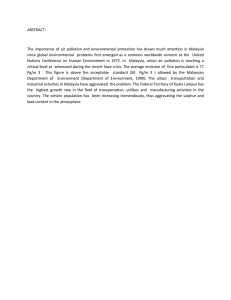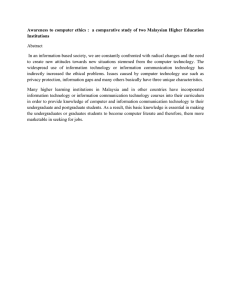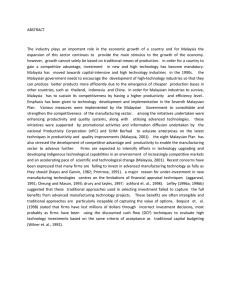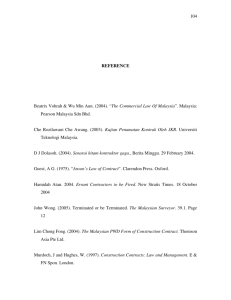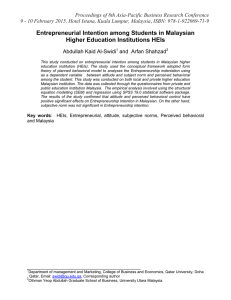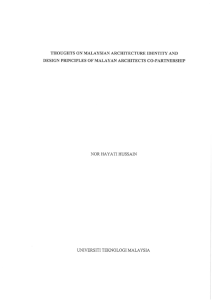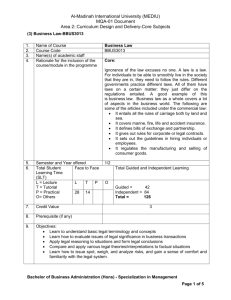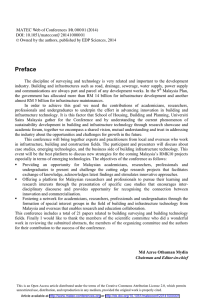Introduction to Law
advertisement
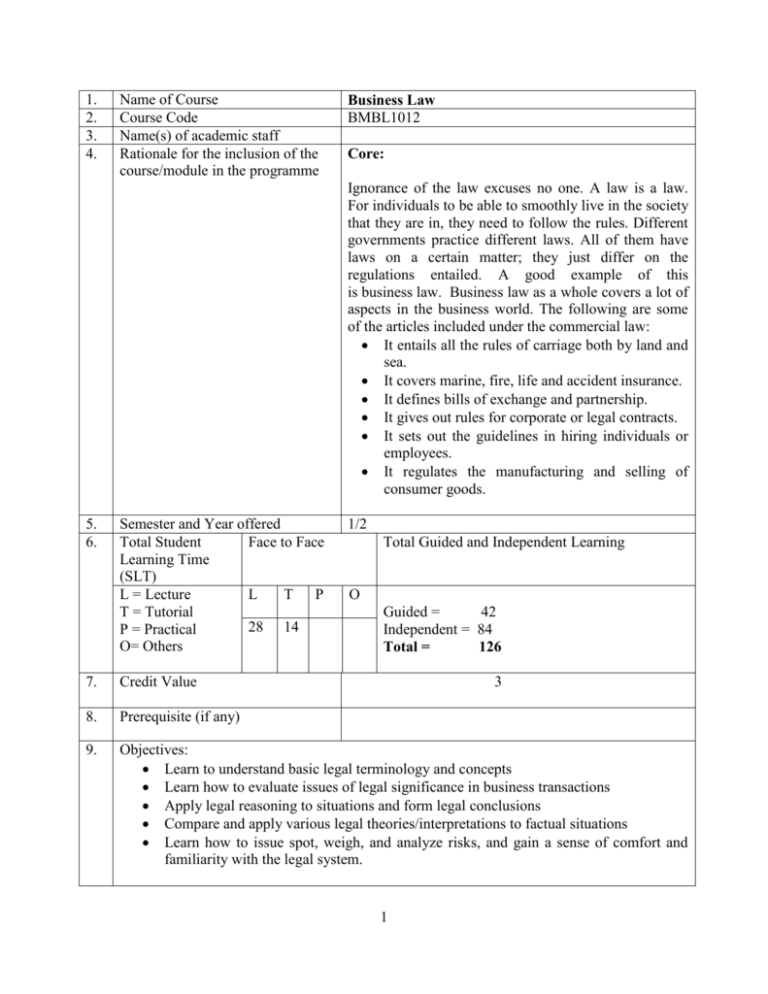
1. 2. 3. 4. Name of Course Course Code Name(s) of academic staff Rationale for the inclusion of the course/module in the programme Business Law BMBL1012 Core: Ignorance of the law excuses no one. A law is a law. For individuals to be able to smoothly live in the society that they are in, they need to follow the rules. Different governments practice different laws. All of them have laws on a certain matter; they just differ on the regulations entailed. A good example of this is business law. Business law as a whole covers a lot of aspects in the business world. The following are some of the articles included under the commercial law: It entails all the rules of carriage both by land and sea. It covers marine, fire, life and accident insurance. It defines bills of exchange and partnership. It gives out rules for corporate or legal contracts. It sets out the guidelines in hiring individuals or employees. It regulates the manufacturing and selling of consumer goods. 5. 6. Semester and Year offered Total Student Face to Face Learning Time (SLT) L = Lecture L T P T = Tutorial 28 14 P = Practical O= Others 1/2 Total Guided and Independent Learning O Guided = 42 Independent = 84 Total = 126 7. Credit Value 3 8. Prerequisite (if any) 9. Objectives: Learn to understand basic legal terminology and concepts Learn how to evaluate issues of legal significance in business transactions Apply legal reasoning to situations and form legal conclusions Compare and apply various legal theories/interpretations to factual situations Learn how to issue spot, weigh, and analyze risks, and gain a sense of comfort and familiarity with the legal system. 1 10. Learning outcomes: At the completion of the subject, students should be able to perform the following tasks: Understand the business and company related legal issues Understand the basics principles related to various issues like liquidation of companies, insurance and revenue Apply the available law to problems that may arise Understand various restrictions in applying the available laws 11. Transferable Skills: This course explores the legal environment in which businesses operate and studies the interaction between business and the legal system. Students examine various areas of the law which are integral to operating a business enterprise. Topics include contracts, torts, agency, Uniform Commercial Code, ethical and criminal implications of business actions, property laws, and the legal aspects of different business entities. Business owners, managers, accountants, paralegals, and all those seeking to gain or broaden their general understanding of the legal system should benefit from this course. 12. 13. Teaching-learning and assessment strategy A variety of teaching and learning strategies are used throughout the course, including: Lecture sessions Tutorial sessions Case Studies Student-Lecturer discussion Collaborative and co-operative learning Workshops and Training Seminars Independent study Assessment strategies include the following: Ongoing quizzes Midterm tests Performance Assessment (Participation, project, Assigned exercises) Case Presentations Synopsis: This course is meant to provide a general introduction to the legal environment that affects individuals, businesses, and business transactions. In addition to providing a general introduction to the Malaysian legal system, this course will focus on specific legal topics such as contracts and the various commercial code 14. Mode of Delivery: Face to Face Lecture sessions Tutorial sessions 2 15. Assessment Methods and Types: The assessment for this course will be based on the following: Coursework 50% Quizzes Assignments Project Mid-Semester Exam Final Examination 16. 10% 10% 10% 20% 50%. Total 100% Mapping of the course/module to the Programme Aims The individual course is mapped to the programme aims using a scale of one to five where (one being the least relevant/related and five being the most relevant/ related). 17. A1 A2 A3 A4 A5 A6 2 2 2 5 2 2 Mapping of the course/module to the Programme Learning Outcomes The learning outcomes of this course are mapped to the eight MQF domains using a scale of one to five where (one being the least relevant/related and five being the most relevant/ related). LO1 LO2 LO3 LO4 LO5 LO6 LO7 LO8 5 2 5 3 2 3 2 5 LO9 2 LO10 LO11 2 3 LO12 2 18. Content outline of the course/module and the SLT per topic WEEK 1, 2 Introduction to Law Law and government, liability under the law. Nature of law; sources of Malaysian law The legal system in Malaysia. Law of Contract (1) Offer and acceptance; consideration Certainty, capacity Terms of a contract and exclusion clauses. 3 Indep. Details WEEK 3 WEEK Total SLT L T 4 2 12 18 2 1 6 9 WEEK 4, 5 WEEK 6 Law of Contract (2) Misrepresentation, mistake Duress Undue influence and illegality Discharge of contract and remedies WEEK 7, 8 Company Law Formation of companies The legal requirements 4 Effects of incorporation Documents that regulate the constitution of a company Companies Act 1965 WEEK 11 Legal Duties of Company’s Officers Directors duties-statutory and common law duties Majority rule and minority protection Duties of secretaries and auditors Meetings and proceedings at meetings Legal consequences when a company goes into liquidation Commercial Law Contracts of sale with reference to the Sale of Goods Act 1957 Contract of sale Hire-purchase agreements and negotiable instruments WEEK 12, 13 WEEK 9, 10 Law of Contract (2) Misrepresentation, mistake Duress Undue influence and illegality Discharge of contract and remedies Insurance Law The types of insurance classifications of insurance insurance contracts insurable interests Implications of contract entered into in utmost good faith, indemnity, subrogation, and contribution. 4 4 2 12 18 2 1 6 9 2 12 18 4 2 12 18 2 1 6 9 4 2 12 18 WEEK 14 19. Revenue Law Administration and the legal implications of the Income Tax Act 1963 Total Main references supporting the course: 2 1 6 9 28 14 84 126 Ewan MacIntyre. (2006). Essentials of Business Law, Pearson, (2nd ed.) Additional references supporting the course: 1. Wu Min Aun. (2005). The Commercial Law of Malaysia. Longman: Malaysia (5th ed.) 2. Lee Mei Peng. (2005).General Principles of Malaysian Law. Penerbit Fajar Bakti: Malaysia. (5th ed.) 3. Jeffrey A. Helewitz (2004), Essentials of Commercial Law, Pearson 20. Other additional information All related subject materials will be available to the students during the period of the course 5
